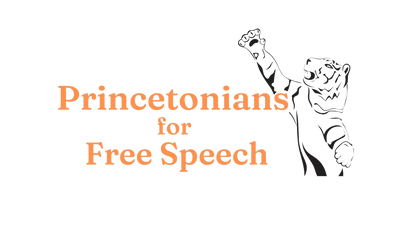Your Cart is Empty
October 28, 2022
By Myles McKnight '23
Princeton sophomore Nate Howard recently added his voice to the string of criticisms of my group, the Princeton Open Campus Coalition (POCC). His criticism––entitled Campus Conservatives in the POCC Don’t Deserve a Monopoly on Free Speech––has the dual distinction of being the least charitable and the least compelling.
Howard claims that the POCC uses the free-speech cause as a mere fig leaf for our “culture war grievances.” The POCC, he says, is simply obsessed with “conservative outrage politics.” Of course, I am dismayed to hear that Howard feels our events are only for students who “ascribe” (sic) to conservative ideals. But this is a silly accusation. The POCC is not simply conservative (the picture is more complicated) and the criticisms Howard proffers are hopeless.
The Princeton Open Campus Coalition promotes a campus environment in which the norms of robust discourse, academic freedom and intellectual diversity are widely cherished. Our governing ideal is truth-seeking, not free speech as such. Free speech is but one of the conditions necessary for the university community to pursue its ideal well, so of course we vocally defend it. But we promote the truth-seeking ideal in other ways too. For example, we host speakers with perspectives that are very infrequently heard––much less tolerated––on campus in order to promote viewpoint diversity and enhance discourse. Thus our invitation last December of Abigail Shrier, author of the best-selling book Irreversible Damage: The Transgender Craze Seducing our Daughters.
On a campus as progressive as ours, neglected perspectives on hot-button issues tend to be “conservative,” so it makes sense that we often invite conservative speakers. But in fact, most of the speakers we’ve hosted have not been right-leaning. Howard and others can gleefully claim otherwise––liberated as they seem to be from the iron fist called reality and data. As an example of one of our so-called “conservative grievance fest[s],” Howard references our smash-hit event, “Mob Rule: The Illiberal Left’s Threat to Campus Discourse.” What Howard must’ve missed is that only one of the three panelists who spoke at that event could plausibly be called “right wing.” The fact that our majority-liberal panel lamented the rise of leftist illiberalism on college campuses––an undeniable phenomenon––does not magically make our event or its speakers uniformly conservative.
Howard’s discussion of “Mob Rule” reveals something important about his supposed commitment to free speech. He claims that the speakers at that event “fantasized about a world where conservatives could face no social repercussions for their speech, no matter how bigoted or virulent.” Howard and his progressive ilk desperately beg the question when they just assume they’ve got it right as to what counts as “bigoted or virulent.” The whole point of dialogue and the exchange of ideas is to discern the truth of these things––so nothing should provoke backlash in our community when articulated with the sophistication, argumentative rigor, and intelligence proper to academic discourse. That’s what academic freedom really means. To the extent Howard implicitly denies this, he’s laid bare his phony commitment to free speech.
While our group and its cause are not inherently conservative, it is true that most (but not all) of our members fall on the right of the political spectrum. What explains this oddity? Well, the free-speech cause has been championed by different ideological wings over the years. During the 50’s, 60’s and 70’s––the McCarthy era, the sexual revolution and the Vietnam War––the loudest free speech advocates were by-and-large progressives who felt their voices were being stifled by conservative institutions. Today the picture is different. Progressive illiberalism and intolerance are ascendant, and it is conservatives and conservative viewpoints which most often provoke unjust reproach and sanction on college campuses. The cause today is a conservative one––in fact if not in theory––because progressives have gotten drunk off the power they’ve won in ivory-tower left-havens like Princeton.
Finally, with respect to the Abigail Shrier event we hosted last December, Howard at least raises an interesting––though faulty––point. He criticizes the POCC for not providing a livestream so that people who couldn’t attend due to our COVID-limited capacity could listen in. No doubt, a livestream would have been a wonderful way to bring Shrier’s stellar speech to a broader audience. Here, Howard and I agree. But as I said then, there was a competing concern. Several attendees expressed discomfort with the livestream because they were worried their peers would “cancel” them for asking honest questions or for simply being there. Their concern was real, and we listened. But don’t let Howard dupe you. We hid nothing. You can watch Shrier’s speech here, or read it here.
I pretend to no “monopoly” on the campus free speech cause. I hold in the highest esteem all––especially progressives––who fight for the academic freedom rights of everyone. As I said in my address last month to Princeton’s freshman class, “free speech is neither a conservative nor a progressive value. It is a truth-seeking value. In the university context, it is an academic value—as deeply rooted in the identity of the university as anything could possibly be.” I stand by that statement. At the same time, it is painfully obvious who the ones doing the necessary fighting today are.

